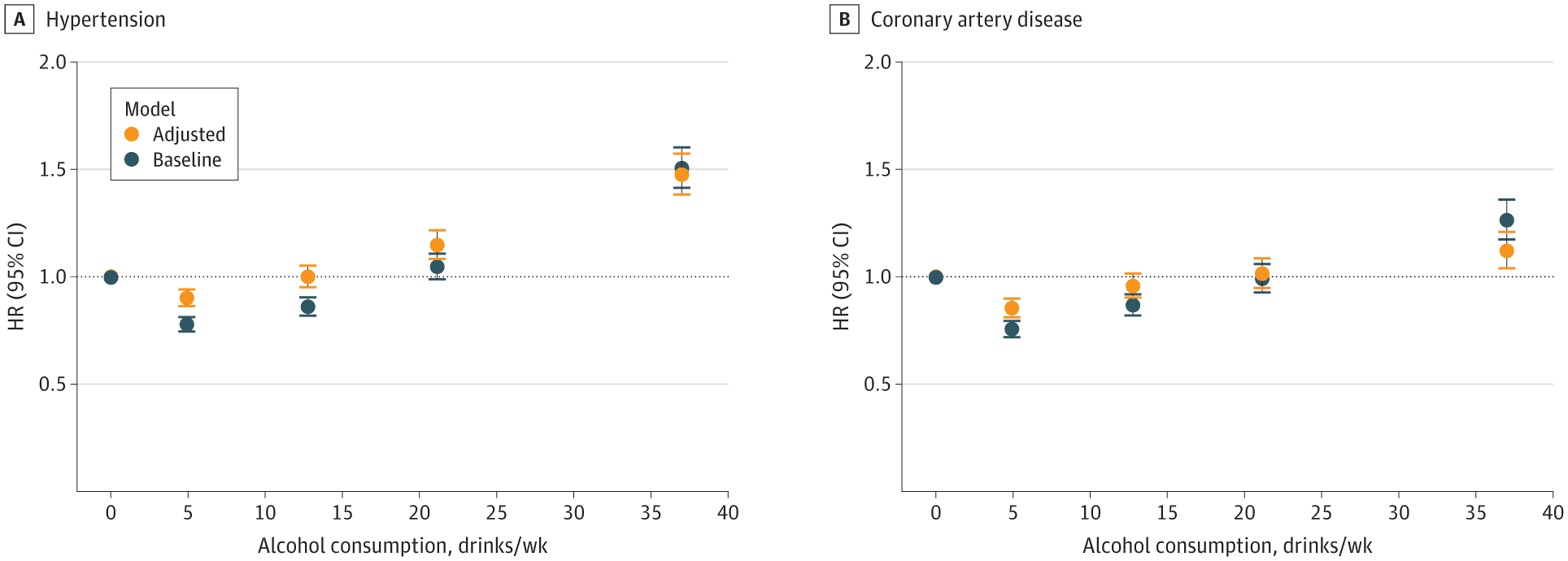What is the effect of alcohol consumption on cardiovascular disease? It is particularly difficult to investigate the effect of moderate consumption. A new study1 uses both the common research method and a newer method based on genetic variation. The common research method shows a protective effect on hypertension and coronary artery disease with moderate alcohol consumption. Adjusting for lifestyle factors slightly weakens this favorable association. The newer method of determining alcohol consumption on the basis of genes shows a slight increase in hypertension and coronary artery disease with moderate consumption.
What is already known? Current epidemiological studies often find cardiovascular benefits of moderate alcohol consumption, while newer gene-based analyses (Mendelian Randomisation, MR) find a possible linear association between alcohol consumption and an increased risk of cardiovascular disease. More research and discussion on the applicability of MR in alcohol research is needed. In addition, experimental studies also find indications for a possible mechanism behind the protective effect of moderate alcohol consumption.
What does this research add? In this study, the researchers look at the extent to which lifestyle factors influence the association between alcohol consumption and cardiovascular disease in a common observational design. In addition, based on genetic variations that are related to alcohol problems, they apply a linear and non-linear variant of MR to evaluate the risk with different amounts of alcohol.
Two types of research
The researchers analysed data of more than 370,000 participants from the UK Biobank database. They looked at the association between alcohol consumption and cardiovascular disease (CVD) in two different ways:
- Via self-reported alcohol consumption, they also looked at the effect of lifestyle factors.
- Via genetic variations, where alcohol consumption is determined by genes associated with alcohol problems.
J-curve and lifestyle factors
The common research method showed the well-known J-shaped curve. In this method questionnaires are used to estimate the average alcohol consumption. Moderate drinkers have a lower risk of coronary artery disease and hypertension compared to people who drink no alcohol and those who drink a lot. After the researchers adjusted the data for six lifestyle factors, the protective effect of moderate alcohol consumption was reduced, but remained (see figure 1).
Figure 1: Association between alcohol consumption and hypertension (A) and coronary artery disease (B) based on self-report and the influence of lifestyle factors.

Adjusted for: smoking frequency, normalized BMI, self-reported physical activity, cooked vegetable intake, red meat consumption, and self-reported health
The researchers emphasize that other lifestyle factors that were not included may have an effect on the outcomes as well.
Research based on genes
The scientists also conduct analyses in which they find that individuals with genetic variants that predict higher alcohol consumption are indeed more likely to consume higher amounts of alcohol, and are more likely to have hypertension and coronary artery disease. These results support a nonlinear risk-enhancing association between all amounts of alcohol consumption and both hypertension and coronary artery disease. There appears to be a modest risk increase with light alcohol consumption and an exponential risk increases with higher consumption levels.
Figure 2: Association between genetically determined alcohol consumption and hypertension (A) and coronary artery disease (B)

The researchers emphasize that the genetic methods should be further investigated in additional, large genetic datasets.
Strengths
Both
- Data analysed in two different ways
- Large dataset, with relatively detailed information
Epidemiological study
- Sick-quitters excluded
- Corrected for important lifestyle factors
Genetic method
- Also looked at a non-linear relationship
Limits
Both
- Both studies are individual studies, no meta-analyses
Epidemiological study
- There may be even more lifestyle factors that have not yet been corrected for
Genetic method
- A relatively new method, of which it is not yet entirely clear whether it is suitable for alcohol research
- There may be connections between the genetic variants included and cardiovascular diseases that disrupt the outcomes
- The genetic variants studied are associated with alcohol problems, so it is not clear to what extent they are suitable to investigate effects of moderate alcohol consumption

